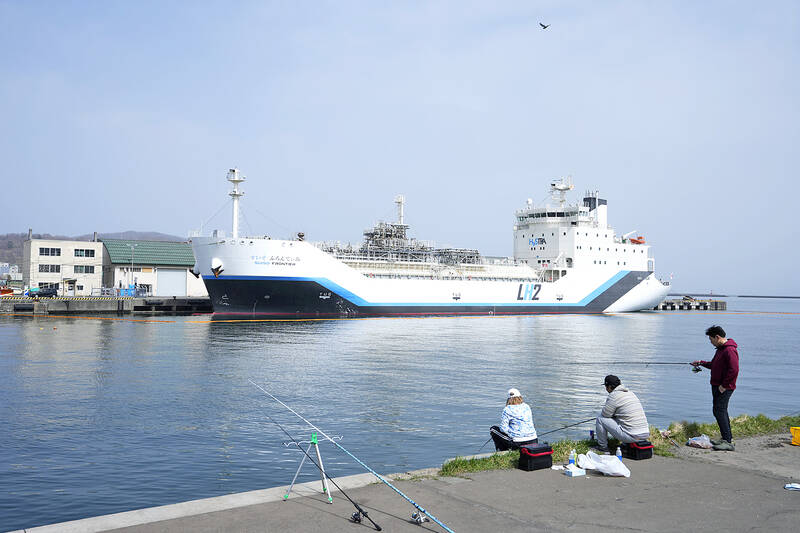The Japanese government yesterday adopted a revision to the country’s plans to use more hydrogen as fuel as part of an effort to reduce carbon emissions.
The plan sets an ambitious target to increase the annual supply by six times the current level to 11 million tonnes by 2040.
It also pledges ¥15 trillion (US$107.73 billion) in funding from private and public sources to build up hydrogen-related supply chains over the next 15 years.

Photo: AP
Japan’s decarbonization strategy centers on using so-called clean coal, hydrogen and nuclear energy to bridge its transition to renewable energy. Russia’s war on Ukraine has deepened concerns over energy security and complicated that effort, but other advanced Western nations are pushing for faster adoption of renewable energy, such as solar, wind and geothermal.
So far, Japan is relying on hydrogen mainly produced using fossil fuels.
Some experts say that strategies such as commercializing the use of hydrogen and ammonia mainly cater to big business interests and major industries that are heavily invested in fossil fuel-based technologies and have influence over government policies.
The revised plan prioritizes nine strategic areas, including development of water electrolysis equipment, fuel storage batteries and large-size tankers for transporting hydrogen.
“Hydrogen is an industrial sector that can make a triple achievement of decarbonization, stable energy supply and economic growth in one shot,” Japanese Chief Cabinet Secretary Hirokazu Matsuno said at the Cabinet meeting yesterday. “We will promote [hydrogen] on a large scale, both demand and supply.”
Japan’s leaders say they want to turn the country into a “hydrogen society,” but the hydrogen industry is still in its initial stages. The government is drafting legislation to support building necessary infrastructure and supply chains for commercial use of pure hydrogen and ammonia, another source of hydrogen.
At a hydrogen council meeting with industrial leaders last week, Japanese Prime Minister Fumio Kishida said that Japan aims to achieve an “Asian zero emission community,” contributing Japanese technology in hydrogen, ammonia and other decarbonization technologies.
“By setting an ambitious goal we aim to make our plans more predictable and encourage long-term investment in developing a large-scale hydrogen supply and demand,” Kishida said.
The Cabinet also approved an annual energy report saying that economic sanctions against Russia for its war on Ukraine have increased long-term competition for liquefied natural gas (LNG), forecasting that shortages could persist through 2025.
European demand for LNG as an alternative to Russian natural gas has pushed LNG prices higher, making it necessary to draw up a long-term strategy for securing stable energy supplies.
Japan adopted a so-called “green transformation” plan in February that calls for promotion of next-generation solar batteries, offshore wind power and renewed use of nuclear energy.

A new online voting system aimed at boosting turnout among the Philippines’ millions of overseas workers ahead of Monday’s mid-term elections has been marked by confusion and fears of disenfranchisement. Thousands of overseas Filipino workers have already cast their ballots in the race dominated by a bitter feud between President Ferdinand Marcos Jr and his impeached vice president, Sara Duterte. While official turnout figures are not yet publicly available, data from the Philippine Commission on Elections (COMELEC) showed that at least 134,000 of the 1.22 million registered overseas voters have signed up for the new online system, which opened on April 13. However,

EUROPEAN FUTURE? Albanian Prime Minister Edi Rama says only he could secure EU membership, but challenges remain in dealing with corruption and a brain drain Albanian Prime Minister Edi Rama seeks to win an unprecedented fourth term, pledging to finally take the country into the EU and turn it into a hot tourist destination with some help from the Trump family. The artist-turned-politician has been pitching Albania as a trendy coastal destination, which has helped to drive up tourism arrivals to a record 11 million last year. US President Donald Trump’s son-in-law, Jared Kushner, also joined in the rush, pledging to invest US$1.4 billion to turn a largely deserted island into a luxurious getaway. Rama is expected to win another term after yesterday’s vote. The vote would

ALLIES: Calling Putin his ‘old friend,’ Xi said Beijing stood alongside Russia ‘in the face of the international counter-current of unilateralism and hegemonic bullying’ Chinese President Xi Jinping (習近平) yesterday was in Moscow for a state visit ahead of the Kremlin’s grand Victory Day celebrations, as Ukraine accused Russia’s army of launching air strikes just hours into a supposed truce. More than 20 foreign leaders were in Russia to attend a vast military parade today marking 80 years since the defeat of Nazi Germany in World War II, taking place three years into Russia’s offensive in Ukraine. Putin ordered troops into Ukraine in February 2022 and has marshaled the memory of Soviet victory against Nazi Germany to justify his campaign and rally society behind the offensive,

CONFLICTING REPORTS: Beijing said it was ‘not familiar with the matter’ when asked if Chinese jets were used in the conflict, after Pakistan’s foreign minister said they were The Pakistan Army yesterday said it shot down 25 Indian drones, a day after the worst violence between the nuclear-armed rivals in two decades. Pakistani Prime Minister Shehbaz Sharif vowed to retaliate after India launched deadly missile strikes on Wednesday morning, escalating days of gunfire along their border. At least 45 deaths were reported from both sides following Wednesday’s violence, including children. Pakistan’s military said in a statement yesterday that it had “so far shot down 25 Israeli-made Harop drones” at multiple location across the country. “Last night, India showed another act of aggression by sending drones to multiple locations,” Pakistan military spokesman Ahmed